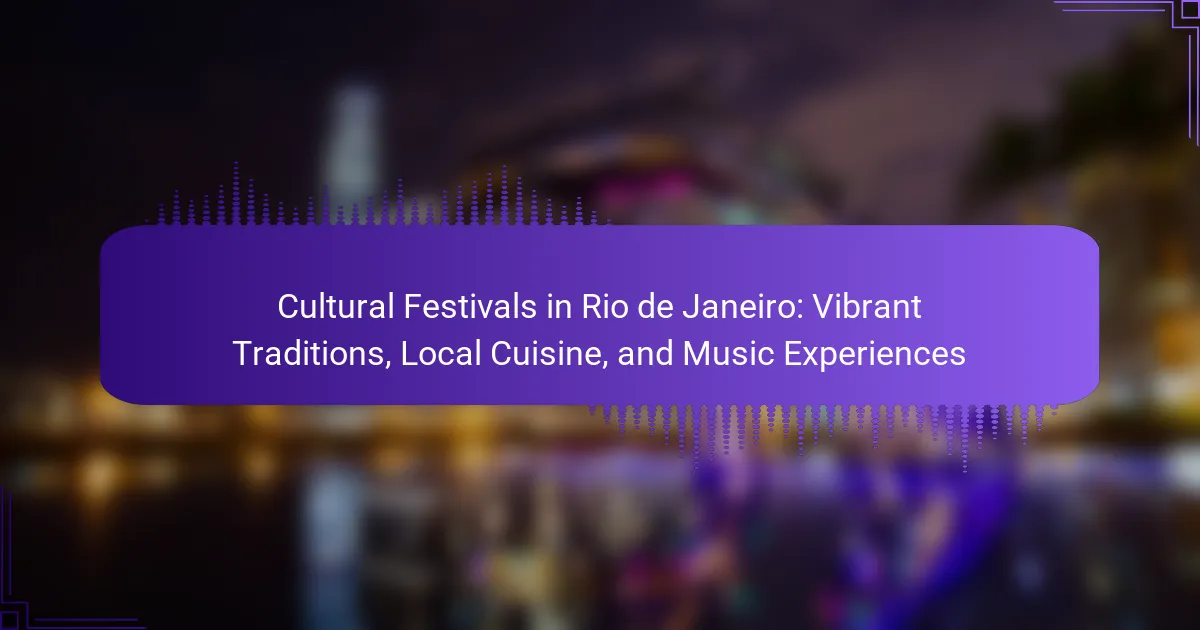Cultural festivals in Rio de Janeiro offer a rich experience of vibrant traditions, local cuisine, and immersive music. Key events like Carnival, Festa Junina, and New Year’s Eve celebrations showcase the city’s unique heritage. Attendees enjoy traditional dishes and lively performances that foster community engagement. These festivals not only highlight cultural diversity but also contribute significantly to the local economy.
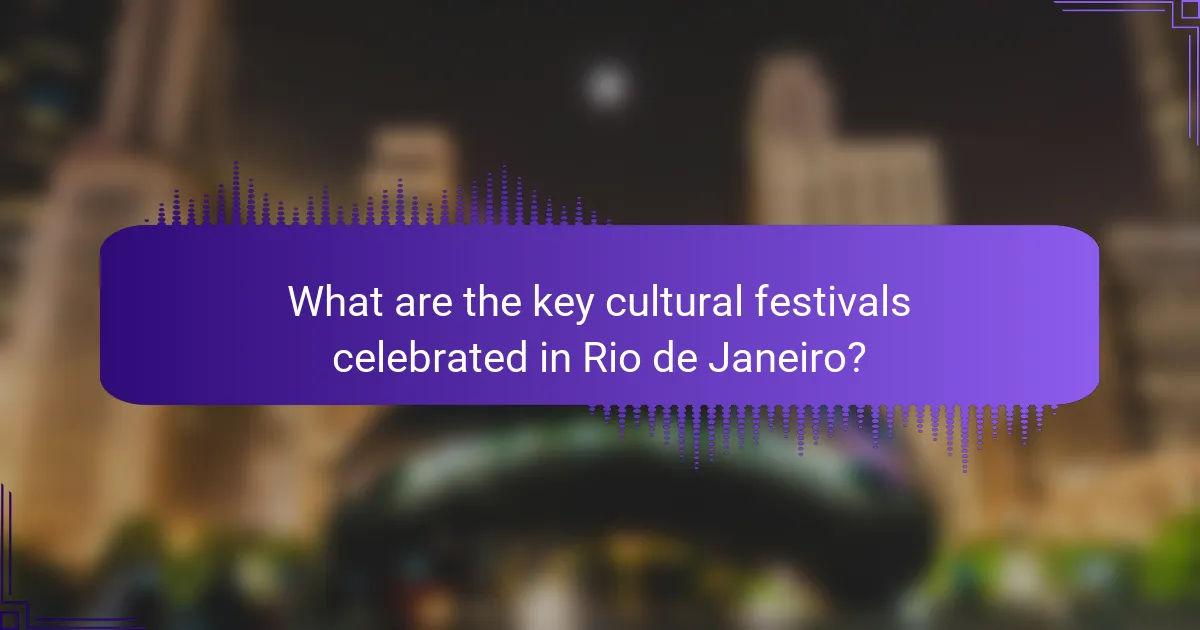
What are the key cultural festivals celebrated in Rio de Janeiro?
Rio de Janeiro celebrates several key cultural festivals that showcase its vibrant traditions, local cuisine, and music experiences. The most notable include Carnival, Festa Junina, and New Year’s Eve celebrations.
Carnival is the largest festival, attracting millions with its samba parades, street parties, and elaborate costumes. It occurs annually before Lent, featuring regional food and music.
Festa Junina celebrates rural life and folklore in June, showcasing traditional dances, food, and bonfires. It highlights local dishes like pamonha and quentão.
New Year’s Eve, known as Réveillon, draws crowds to Copacabana Beach for fireworks, music, and festivities. Attendees often wear white for good luck while enjoying traditional foods like lentils.
These festivals reflect the rich cultural tapestry of Rio, making it a unique destination for cultural experiences.
How do these festivals reflect local traditions and values?
Cultural festivals in Rio de Janeiro vividly reflect local traditions and values through their vibrant celebrations. These events showcase the rich heritage of the city, highlighting elements such as music, dance, and culinary practices that are integral to the community’s identity. For instance, the Carnival features samba music and elaborate parades, symbolising unity and joy among residents. Additionally, local cuisine served during these festivals emphasises traditional ingredients and recipes, reinforcing cultural pride. The emphasis on community participation in these festivals fosters social bonds and preserves historical narratives, making them essential to Rio’s cultural landscape.
Which festivals are the most popular among locals and tourists?
The most popular festivals in Rio de Janeiro among locals and tourists are Carnival, Festa Junina, and New Year’s Eve celebrations. Carnival showcases vibrant parades, samba music, and elaborate costumes, attracting millions. Festa Junina celebrates rural traditions with local cuisine, music, and dance, engaging communities. New Year’s Eve features fireworks on Copacabana Beach, drawing large crowds for festivities and celebrations. Each festival offers unique experiences that highlight Rio’s rich cultural heritage.
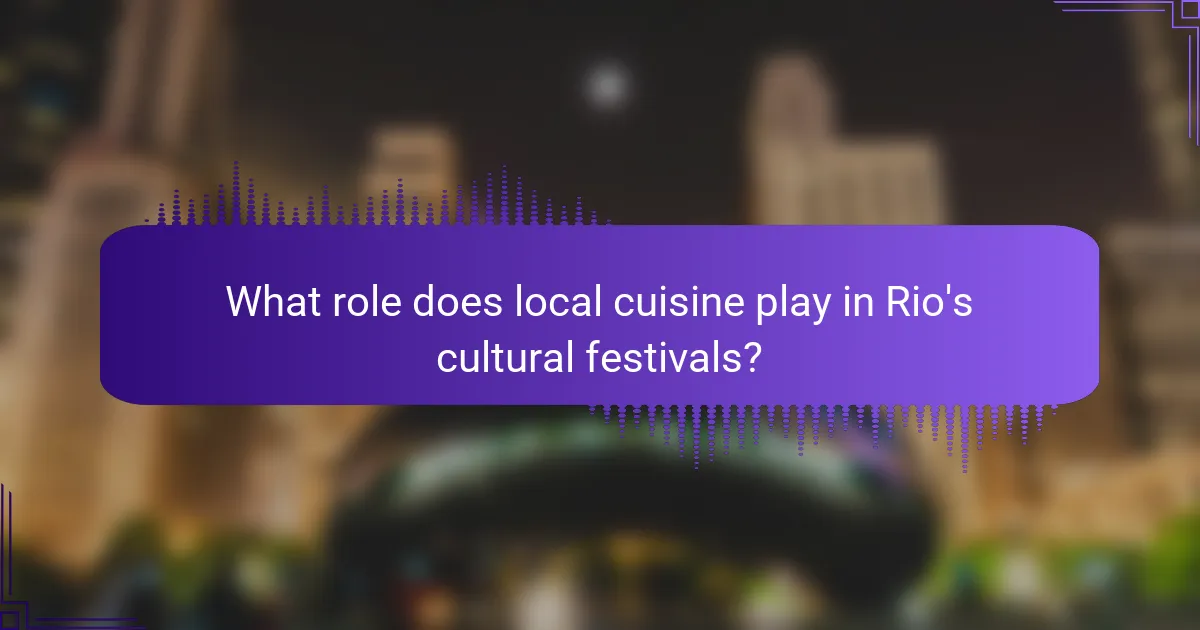
What role does local cuisine play in Rio’s cultural festivals?
Local cuisine is integral to Rio’s cultural festivals, showcasing the city’s heritage and community spirit. Dishes like feijoada and acarajé highlight the region’s diverse influences. These culinary experiences enhance the festive atmosphere, connecting attendees to local traditions. Additionally, food stalls and local chefs play pivotal roles in festival celebrations, offering unique flavours and fostering cultural exchange.
Which traditional dishes are commonly featured during these celebrations?
Traditional dishes commonly featured during cultural festivals in Rio de Janeiro include feijoada, pão de queijo, and brigadeiro. Feijoada is a black bean stew with pork, often served with rice and orange slices. Pão de queijo are cheese bread rolls, popular as snacks. Brigadeiro is a chocolate truffle made from condensed milk, cocoa powder, and butter. These dishes reflect local flavours and culinary heritage, enhancing the festive atmosphere.
How do food offerings vary between different festivals?
Food offerings at festivals in Rio de Janeiro vary significantly, reflecting the cultural diversity and local traditions. Each festival features unique dishes that celebrate regional ingredients and culinary heritage. For example, during Carnival, street food like coxinha and pastel is popular, while Festa Junina highlights traditional foods such as pamonha and canjica. The influence of African, Indigenous, and European cuisines creates a vibrant tapestry of flavours at these events. Additionally, local beverages like caipirinha complement the festive atmosphere, enhancing the overall experience.
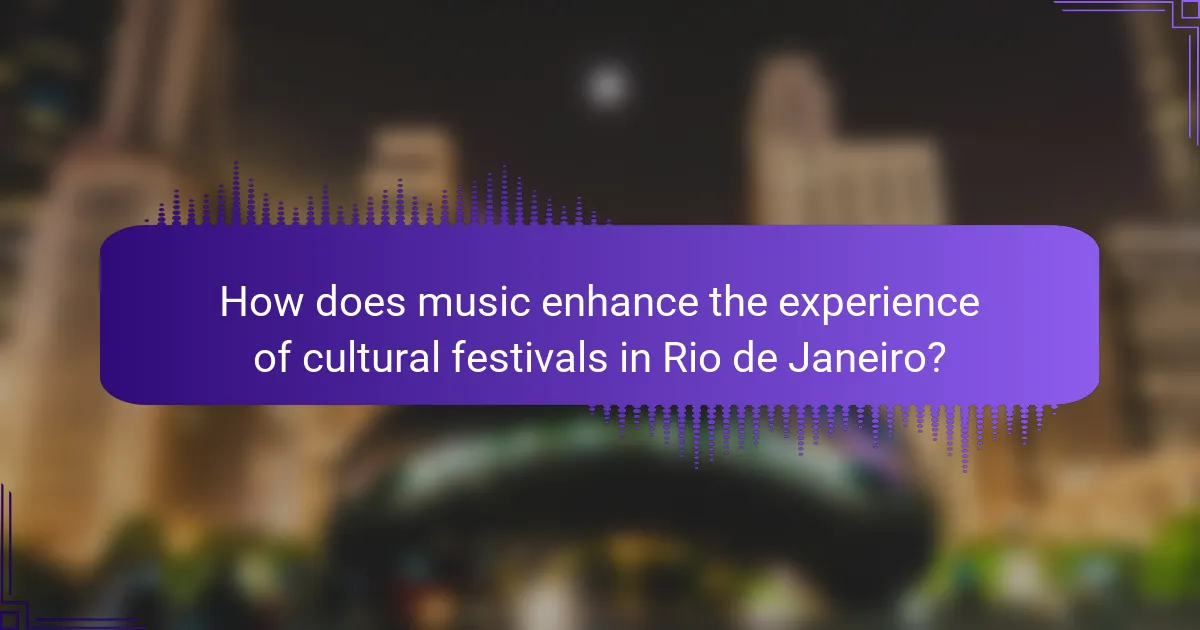
How does music enhance the experience of cultural festivals in Rio de Janeiro?
Music significantly enhances the experience of cultural festivals in Rio de Janeiro by creating an immersive atmosphere. It fosters community engagement and showcases local talent, enriching the celebration of vibrant traditions. The rhythmic sounds of samba, bossa nova, and other genres resonate with attendees, promoting a sense of unity. Additionally, live performances often highlight the unique attributes of Brazilian culture, drawing tourists and locals alike. This musical backdrop complements the diverse local cuisine, making festivals memorable experiences that celebrate Rio’s rich heritage and social fabric.
What types of music are most commonly performed at these events?
Cultural festivals in Rio de Janeiro commonly feature samba, bossa nova, MPB (Música Popular Brasileira), and forró. These genres reflect the city’s rich musical heritage and vibrant cultural expressions. Samba, known for its rhythmic beats, is particularly prominent during Carnival celebrations. Bossa nova offers a softer, melodic style, while MPB blends traditional and contemporary influences. Forró, with its lively danceable tunes, adds to the festive atmosphere.
How do local musicians contribute to the festival atmosphere?
Local musicians significantly enhance the festival atmosphere by fostering community engagement and cultural expression. Their performances reflect the rich musical heritage of Rio de Janeiro, showcasing genres like samba and bossa nova. This connection to local traditions creates an immersive experience for festival-goers. Additionally, live music energises crowds, encouraging participation and celebration, which are vital elements of cultural festivals. The unique sounds and rhythms resonate with attendees, making the festival memorable and lively.
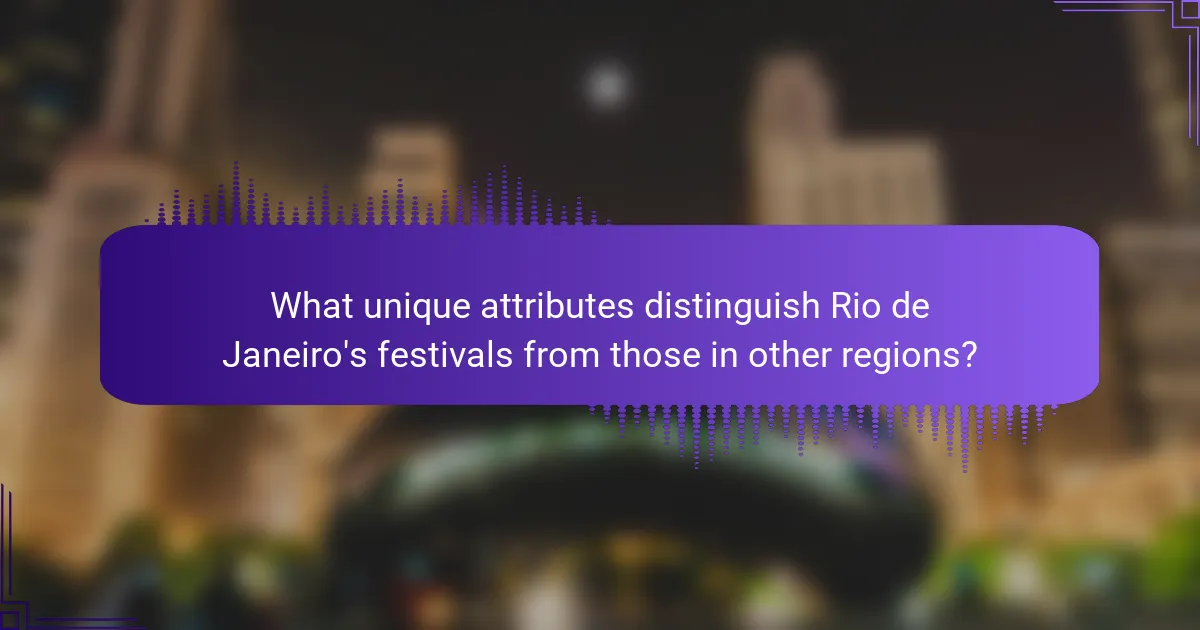
What unique attributes distinguish Rio de Janeiro’s festivals from those in other regions?
Rio de Janeiro’s festivals are distinguished by their unique blend of Afro-Brazilian culture, samba music, and vibrant parades. The city’s Carnival, for instance, showcases elaborate floats and costumes that embody local traditions. Additionally, the emphasis on community participation in events like the Festas Juninas highlights the region’s strong social bonds. The fusion of diverse culinary offerings, such as feijoada and street food, further sets these festivals apart from those in other regions.
How do specific cultural influences shape the festivals’ character?
Cultural influences significantly shape the character of festivals in Rio de Janeiro through unique traditions, local cuisine, and music styles. The vibrant Carnaval exemplifies this, showcasing Afro-Brazilian rhythms and samba dance, which reflect the city’s diverse heritage. Local cuisine, featuring dishes like feijoada, adds depth, connecting attendees to the region’s history. Additionally, the incorporation of indigenous elements and European traditions enhances the festivals’ richness, creating a multifaceted cultural experience.
What rare or lesser-known festivals exist in Rio?
Rio de Janeiro hosts several rare festivals that showcase its unique cultural richness. One such event is the Festa de Iemanjá, celebrated on February 2nd, honouring the Afro-Brazilian goddess of the sea with offerings and music. Another lesser-known festival is the Festival de Inverno de Petrópolis, which features classical music and takes place in July, attracting local and international artists. Additionally, the Festa do Divino Espírito Santo, celebrated in May, combines religious rituals with vibrant parades and local cuisine, reflecting the city’s diverse heritage. Each of these festivals highlights specific cultural attributes, contributing to Rio’s vibrant festival landscape.
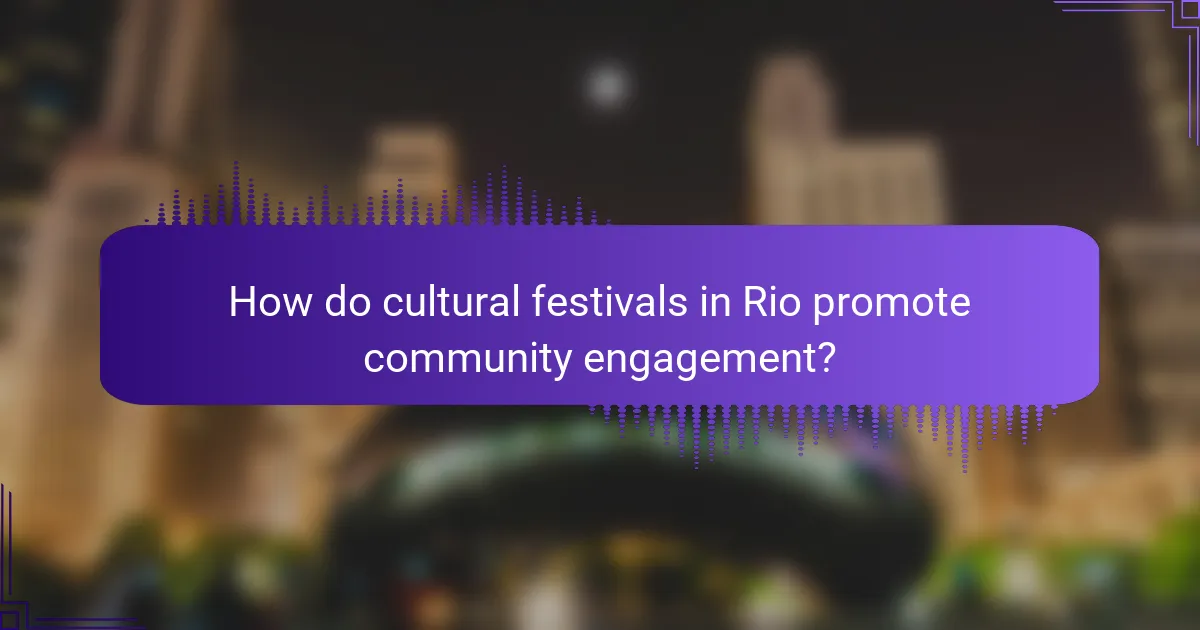
How do cultural festivals in Rio promote community engagement?
Cultural festivals in Rio de Janeiro significantly enhance community engagement by fostering social connections and celebrating local heritage. These events bring together diverse groups, promoting unity through shared experiences. Festivals like Carnaval and Festa Junina highlight traditional music, dance, and cuisine, encouraging participation from all ages. As a result, they strengthen community bonds and create a sense of belonging among residents.
What initiatives encourage local participation in festival activities?
Local participation in festival activities is encouraged through community workshops, volunteer programs, and local partnerships. These initiatives foster engagement by allowing residents to showcase their talents and traditions. For example, local chefs often lead cooking classes highlighting regional cuisine. Additionally, music and dance groups invite community members to join performances, enhancing cultural exchange. These efforts create a sense of ownership and pride among locals, enriching the festival experience for all attendees.
How do festivals serve as platforms for cultural exchange?
Cultural festivals in Rio de Janeiro facilitate cultural exchange by showcasing diverse traditions, local cuisine, and music experiences. These events attract both locals and international visitors, fostering connections through shared experiences. For example, the Rio Carnival features samba music and dance, highlighting Afro-Brazilian heritage and inviting participation from various cultures. Additionally, food stalls offer traditional Brazilian dishes, allowing attendees to explore culinary diversity. Such interactions enhance mutual understanding and appreciation among participants, making festivals vital platforms for cultural dialogue.
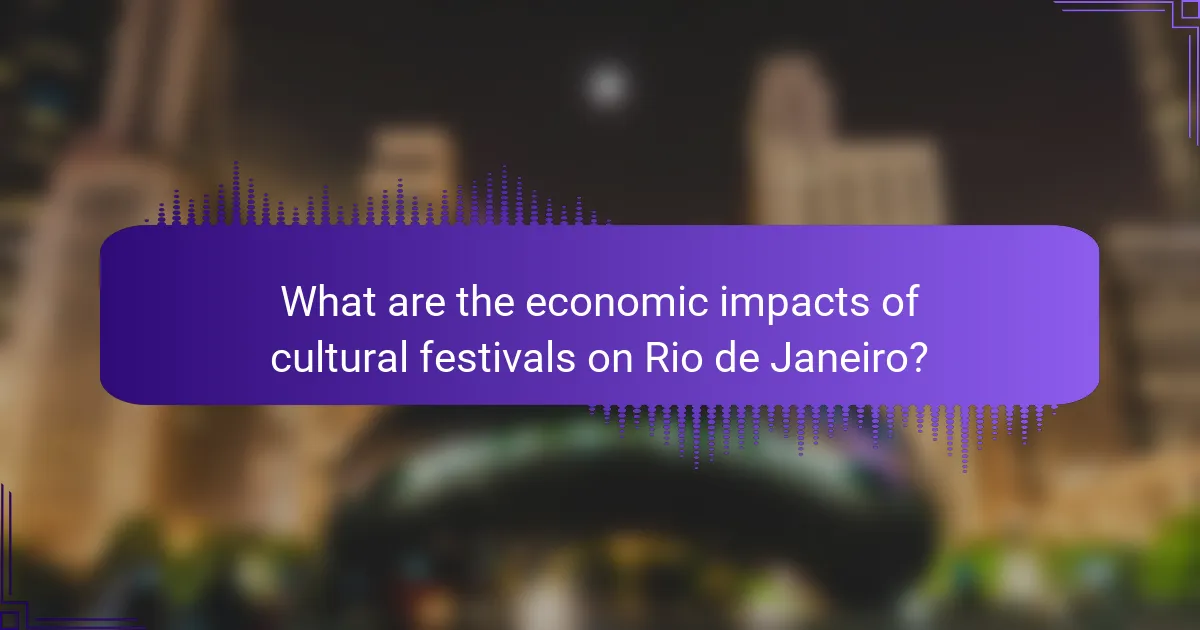
What are the economic impacts of cultural festivals on Rio de Janeiro?
Cultural festivals in Rio de Janeiro significantly boost the local economy. These events attract millions of tourists, generating substantial revenue for businesses and creating jobs. The Carnival alone contributes approximately $1 billion annually, highlighting its economic importance. Local artisans and food vendors benefit from increased sales during festivals, showcasing the region’s vibrant traditions and cuisine. Additionally, cultural festivals enhance community engagement and promote cultural heritage, further strengthening economic ties.
How do festivals drive tourism and local business?
Cultural festivals in Rio de Janeiro significantly enhance tourism and support local businesses. These events attract visitors seeking vibrant traditions, unique cuisine, and immersive music experiences.
Festivals like Carnival showcase local culture, drawing millions of tourists annually. This influx boosts hotel occupancy, restaurant sales, and local artisan markets. For example, Carnival alone generates over $1 billion in economic activity.
Moreover, festivals promote local cuisine, allowing food vendors to thrive. Traditional dishes served at these events create a culinary experience that visitors cherish. This culinary focus enhances the city’s reputation as a gastronomic destination.
Additionally, music experiences during festivals foster community engagement and cultural exchange. Local musicians gain exposure, leading to increased bookings and opportunities. This symbiotic relationship between festivals and local businesses drives sustainable economic growth in Rio de Janeiro.
What challenges do festival organizers face in sustaining these events?
Festival organizers in Rio de Janeiro face numerous challenges in sustaining cultural events. Key issues include funding limitations, logistical complexities, and environmental factors.
Funding is often insufficient, affecting resource allocation for security, permits, and infrastructure. Logistical challenges arise from coordinating transportation, vendor management, and crowd control. Environmental factors, such as weather conditions, can disrupt schedules and impact attendance.
Additionally, maintaining community engagement and addressing safety concerns are critical for the longevity of these festivals. The unique cultural identity of Rio influences these challenges, making it essential for organizers to adapt and innovate.
What best practices can enhance the success of cultural festivals in Rio?
To enhance the success of cultural festivals in Rio de Janeiro, organizers should focus on community involvement, diverse programming, and effective marketing. Engaging local artists fosters authenticity and strengthens cultural ties. Including varied activities attracts wider audiences and enhances visitor experiences. Utilizing social media and partnerships with local businesses amplifies reach and participation.
